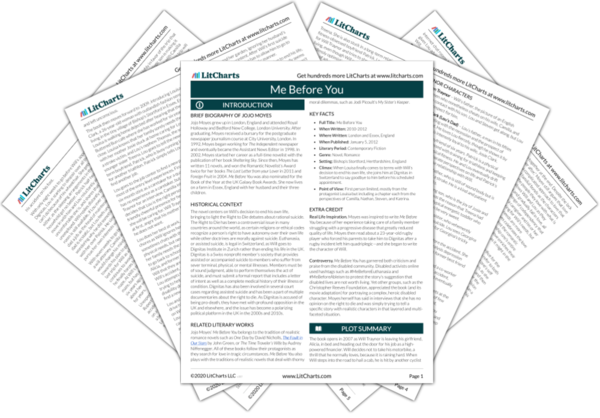In centering the novel around a quadriplegic man, Moyes explores what it means to be healthy and fit. Moyes draws a distinction between mental health and physical health and argues against subconsciously equating mental and physical fitness. Moyes contrasts the mental and physical states of Lou’s Granddad, who has suffered a stroke and is no longer fully lucid, and Will, who can no longer use much of his body after a traffic accident but has no trouble with his mind. While it might seem that Will is better off because of his mental fitness, Will’s mental health actually suffers horribly because he is aware of how much he has lost. Granddad, meanwhile, seems blissfully unaware of his loss and is still able to enjoy the simple things in life.
Will and Patrick, Lou’s long-term boyfriend, are also contrasted in terms of physical fitness. According to conventional romance stories, the more physically fit person is often the better romantic partner. Patrick is seemingly more attractive because of his peak physical shape—yet Will is a better emotional and mental match for Lou regardless of his physical disability. Furthermore, Patrick is so focused on fine-tuning his body that he ignores building an emotional connection with Lou. Will is able to prove that he is a better emotional and mental match for Lou because he meets her on those levels and appreciates her for who she is on the inside.
In both of these examples, Moyes shows that fitness and health are complex. Mental and physical health are different, but they are also interrelated and hard to untangle, as each has a profound influence on the other. Lou, as Will’s caregiver, is supposed to care for his physical needs, yet this requires her to care for his mental and emotional needs as well. Moyes asserts that true health and fitness means finding a balance between mental and physical fitness, as well as the emotional needs that all humans share.
Fitness ThemeTracker

Fitness Quotes in Me Before You
“You were just looking at my photographs. Wondering how awful it must be to live like that and then turn into a cripple.”
Patrick had never minded the fact that I dressed “inventively,” as he put it. But what if he hadn’t been entirely truthful? Patrick’s job, his whole social life, now revolved around the control of flesh – taming it, reducing it, honing it. What if, faced with those tight little track-suited bottoms, my own suddenly seems wanting? What if my curves, which I had always thought of as pleasantly voluptuous, now seemed doughy to his exacting eyes?
…Granddad was picking at his plate with greedy delight, letting out what we called his “food noises” – little grunts and murmurs of pleasure.
“Delicious salmon,” Will said to my mother. “Really lovely flavor.”
Now he was just Will – maddening, mercurial, clever, funny Will – who patronized me and liked to play Professor Higgins to my Eliza Doolittle. His body was just a part of the whole package, a thing to be dealt with, at intervals, before we got back to the talking. It had become, I supposed, the least interesting part of him.
“It feels like I might be running, but I feel like I’m permanently just a little bit behind the rest of the field. I feel like…” He took a deep breath, as if he were trying to compose himself. “I feel like there’s something bad around the bend, and everyone else seems to know what it is except me.”
“Well, you don’t have to let that… that chair define you.”
“But it does define me, Clark. You don’t know me, not really. You never saw me before this thing. I loved my life, Clark. Really loved it… I led a big life.” His voice had lifted now. “I am not designed to exist in this thing – and yet for all intents and purposes it is now the thing that defines me.”











